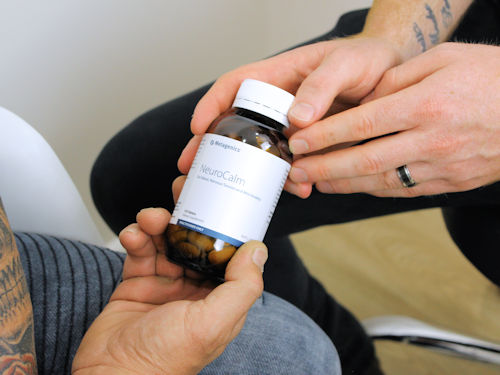Quick Summary
Panic attacks can feel overwhelming, with symptoms like racing heart, dizziness, and breathlessness. Triggers include stress, sleep deprivation, and certain health conditions. While conventional techniques like deep breathing, grounding exercises, and avoiding caffeine/alcohol help, natural therapies offer additional support.
Acupuncture can calm the nervous system, regulate stress hormones, and reduce panic frequency. Natural supplements like Magnesium CalmX and NeuroCalm support relaxation by balancing neurotransmitters. With targeted strategies and holistic care, panic attacks don’t have to control your life—personalised treatments can help restore calm and balance.
Many people who experience panic attacks describe them as an invisible storm that wreaks havoc on their emotional and physical health. Even when there is no apparent threat or imminent danger, these episodes can emerge abruptly, plunging sufferers into a pit of intense fear and anxiety. The unpredictability of these attacks exacerbates the distress, as one is continuously on guard for the next episode.
The physical manifestations of a panic attack, such as a rapid heartbeat, vertigo, and chest pain, can be so pronounced that they resemble the symptoms of more severe conditions, such as heart attacks. The onset of these symptoms causes many people to hurry to emergency rooms, only to discover that their distress was caused by a panic attack. Such incidents only emphasise the need for effective management strategies to combat such occurrences.
If you or someone that you know has experienced panic attacks, then keep reading because we’re going to be taking a deep dive into understanding panic attacks and effective management techniques so that panic attacks no longer have to control life when they emerge.
Understanding Panic Attacks
Panic attacks, though commonly heard of, are often misunderstood by those who have never experienced one. To fully grasp the depth and breadth of their impact, one must delve into their definition, triggers, and broader repercussions.

Signs and Symptoms of Panic Attacks
At their core, panic attacks are unexpected and abrupt surges of overpowering fear or anxiety. Their onset is typically swift, without any obvious signs leading up to the episode. This feeling of intense dread often engulfs the person, even in situations where there is no tangible threat.
The symptoms are various and can be quite unsettling. A person undergoing a panic attack might experience a racing or pounding heart, an overwhelming sensation of sweating even in cool environments, and uncontrollable trembling or shaking. Breathing becomes rapid, often feeling short or constricted, and this is coupled with an all-encompassing sense that something catastrophic is imminent, popularly described as a feeling of “impending doom.”
What Causes Panic Attacks?
Although their onset can appear mysterious, panic attacks often have triggers, though they may vary widely from person to person. Common culprits include acute or prolonged stress, sleep deprivation, reactions to certain medications, or specific physical conditions. For instance, thyroid issues, which affect the body’s metabolism and energy production, can surprisingly be a trigger for some.
Recognising and understanding these triggers is fundamental. By identifying what sparks an attack, individuals are better equipped to anticipate and potentially mitigate the severity or even the onset of an episode.
The Impact of Panic Attacks
While the immediate physical symptoms are undoubtedly distressing, the shadows cast by panic attacks linger much longer. Emotionally, the aftermath can be equally, if not more, challenging. Many grapple with feelings of embarrassment, especially if an attack occurs in a public or an unfamiliar setting. The vulnerability felt during an episode can evolve into persistent feelings of depression, rooted in the unpredictability of the next episode, and mentally replaying past episodes. Moreover, a continuous, lurking fear of another attack can create a heightened state of anxiety, sometimes leading individuals to avoid situations or places where they’ve previously experienced an attack.
In essence, panic attacks are not just momentary events of intense fear; they are a complex interplay of emotional and physical reactions that can significantly affect an individual’s quality of life.
Techniques for Managing Panic Attacks
Panic attacks, with their uncanny ability to disrupt daily life, require a comprehensive arsenal of management techniques. Over the years, several conventional methods have gained prominence, offering a solution to those affected. Let’s delve deeper into these tried-and-true techniques:
Deep Breathing
During a panic attack, breathing can become rapid and shallow, further exacerbating feelings of suffocation or tightness in the chest. Deep breathing stands as one of the most immediate and effective countermeasures to the symptoms of a panic attack.
By taking deliberate, deep, and slow breaths, individuals can help stabilise their heart rate and induce a calming effect. This method acts on the nervous system, shifting it from a state of high alertness (sympathetic mode) to a more relaxed state (parasympathetic mode). Moreover, focusing on the rhythm of one’s breath can serve as a much-needed distraction from the overwhelming sensations of a panic attack.
Grounding Techniques

Grounding techniques, as the name suggests, aim to “ground” an individual in the present moment. The “5-4-3-2-1” method is particularly popular. Here’s how it works:
5: Identify five things you can see around you. It could be a pen, a spot on the ceiling, or anything else in your environment.
4: Identify four things you can touch or feel against your skin. This might be the texture of your clothing, the surface of a desk, or the cool air from an AC.
3: Identify three things you can hear. This could be the hum of a refrigerator, chirping birds outside, or distant traffic sounds.
2: Identify two things you can smell. If you’re indoors and can’t immediately pick out distinct smells, think of your two favourite scents instead.
1: Identify one thing you can taste or one thing that’s good about yourself.
This technique diverts the mind from the sensations of the panic attack, tethering it to the immediate surroundings and reality.
Avoidance of Caffeine and Alcohol
Caffeine, a stimulant, can exacerbate the heart’s palpitations and jitteriness, symptoms commonly associated with panic attacks. Meanwhile, alcohol, despite its initial sedative effects, can lead to heightened anxiety as its effects wear off, potentially triggering a panic episode. For those susceptible to panic attacks, it might be beneficial to monitor and possibly reduce their intake of these substances to prevent unintended flare-ups.
Talk to Someone
The power of verbalising one’s feelings should never be underestimated. Speaking to a trusted individual, whether it’s a friend, family member, or therapist, can offer immediate relief. Articulating the emotions and sensations experienced during an attack can help in processing them and can also provide a fresh perspective on coping strategies. The mere act of sharing can instil a sense of support and understanding, alleviating some of the isolation that comes with such episodes.
While these techniques have proven beneficial to countless individuals, some sufferers of anxiety and panic attacks may also benefit from natural therapies such as Acupuncture and natural supplements.
How Acupuncture Helps Manage Panic Attacks

The ancient practice of Acupuncture is now backed by numerous recent scientific studies as being effective for the treatment of anxiety and panic attacks. While traditionally explained through concepts like qi and meridians, the effectiveness of Acupuncture in today’s terms is best described through understanding its impact on the nervous system and balancing stress hormones.
Stimulating the Parasympathetic Nervous System:
The body’s innate “fight or flight” response, controlled by the sympathetic nervous system, is a primal reaction to perceived threats. Panic attacks often trigger this response, causing the intense and distressing symptoms many experience.
Acupuncture, through its targeting of specific points, can activate the parasympathetic nervous system—often termed the “rest and digest” system. By doing so, it dampens the heightened state of alertness, coaxing the body into a state of relaxation and calm. This counteraction is pivotal in alleviating the overwhelming sensations during a panic attack.
Balancing Stress Hormones:
Hormonal balance plays a crucial role in our emotional and physiological well-being. Cortisol, commonly known as the ‘stress hormone,’ tends to be elevated during episodes of prolonged anxiety or during panic attacks.
Regular Acupuncture sessions have been shown to modulate the secretion of this hormone, promoting equilibrium. By maintaining a hormonal balance, Acupuncture not only reduces the likelihood of panic attacks occurring but also ensures a more resilient and swift recovery post-episode.
In essence, while Acupuncture might have roots in age-old practices, its modern application is deeply entrenched in scientific rationale. By manipulating the body’s nervous system and hormonal balance, it offers a promising, progressive tool in the arsenal against panic attacks.
Natural Supplements for Managing Panic Attacks
While traditional techniques for managing panic attacks have proven their effectiveness over time, many are turning to natural supplements as a complementary approach. Specifically, two products that we are aware of—Magnesium CalmX by Metagenics and NeuroCalm by Metagenics—for their potential to provide additional layers of support. Below, we explore how these supplements can offer a helping hand in your journey toward emotional and physical health.

Magnesium CalmX
Magnesium is an essential mineral, often referred to as the “relaxation mineral,” with a central role in the physiological processes that promote relaxation. In a body swayed by the turbulent emotions of a panic attack or gripped by the claws of generalized anxiety, magnesium can be your calming ally. Magnesium CalmX, by Metagenics is not your ordinary magnesium supplement. It’s formulated to offer enhanced absorption and utilisation by the body. When ingested, it helps regulate neurotransmitters, the chemical messengers in the brain, aiming to calm the nervous system. Moreover, magnesium helps with muscle relaxation, which can be particularly beneficial when your body is tense during an anxiety or panic episode.
NeuroCalm
NeuroCalm is another stellar product designed to combat the psychological and physiological manifestations of anxiety. Its formulation includes a blend of herbal extracts and nutrients like Zizyphus, Passionflower, and Magnolia, renowned for their calming effects.
The ingredients in NeuroCalm work synergistically to modulate the production of neurotransmitters like GABA (gamma-aminobutyric acid), often referred to as the “calm-inducing neurotransmitter.” By impacting these neurotransmitters, NeuroCalm helps reduce feelings of stress and anxiety, making it a valuable asset during a panic episode or in dealing with generalised anxiety.
Recommended Usage
Both of these quality products are only prescribed by a healthcare provider, and appropriate recommendations are always provided for your individual needs.
Conclusion
Anxiety and fear can settle over a person’s existence like a persistent storm during a panic attack. The chaotic physical and emotional experiences that accompany these attacks can leave victims feeling helpless and overpowered. Nonetheless, it is essential to recognise that there are a variety of tools and techniques available to assist with the management of these episodes.
If you are struggling with panic attacks and are looking for an innovative, science-based approach to regaining control of your life, our helpful staff are here to assist you. We comprehend the nuances of panic attacks and the life-altering effects they can have. We are committed to providing compassionate, individualised care that meets your specific requirements.
Don’t let panic attacks prevent you from experiencing life’s complete joy. Contact us today on (02) 4709 6727 to learn more about how natural therapies and supplements can be useful tools on your path to a more tranquil, balanced lifestyle.
You can also conveniently schedule an appointment online, which may be a first step towards overcoming panic attacks. We look forward to discussing how we can help in your situation!






